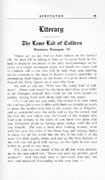 |
Literary
The Lame Lad of Culdeen
Rosemary Branagan, '19
"Shure, an' ye say that ye don't believe in the fairies? Oh, 'tis then I'll be taking it that ye've never been in Ireland to listen to the music of the fairy merrymakings on the raths of a bright moonlight night, nor heard the Lame Lad of Culdeen tell of the wee folk he had often seen dancing on the cobwebs to the tun of Master Locust's mandolin, or strumming their banjos on the banks of a pool, down which floated the Fairy Queen in a water-lily boat.
Ah, and ye ask me, 'Who was the Lame Lad of Culdeen?' Shure, and wasn't he the most mervelous story-teller in all Donegal--himself that could see the little people so plainly, having lived with them nigh onto ten years?
Oh, I can just see you smile, but certain it is, that when the Lad was just a wee toddler with limbs as straight as yours or mine, his mother took him to the county fair at Kilgerry, and so wonderful were the stalls, and so big the crowd, that she lost the wee fellow near the booth of the woman who read your fortune in the palm of you hand--the same that was whispered about as having queer doings with the evil one himself. She was a most dour looking woman, what with her eyes the color of the black bog, and strange lights in them, for all the world like the fire of the will o' of the wisp of a dark night; shure, and just as the false lantern of the evil one led good folk astray, so the light in her eyes boded no good to any man.
The Lad was not afraid of her at all, but went pluckily up to her and asked her, "Have you seen my mother, good woman?" And she--bad luck to her--took him into the tent, and muttered ill-sounding words over him. --
|
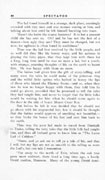 |
The lad found himself in a strange, dark place, seemingly crowded with tiny men and wee women staring at him, and talking about him until he felt himself bursting into tears.
'Hasn't the bairn the coarse features? It is but a peasant child she has sent us. Oh! and he has not the feet of a dancer--how ugly they are! They must be changed, but not now, for ugliness is often found in usefulness.'
Thus was the lad first received by the little people, and so well did they like his bonny ways, and his aptness in playing the fairy pipes, that they kept him with them for a long, long time until he was no more a lad, but a youth, with strange, yearning thoughts of life on the earth to haunt him. He was happy with them no more.
The fairies had given him the gift of story-telling, and many were the tales he could make of the primrose ring and the wilful little sprites who bathed in honey the lips of those who kissed the Blarney Stone,--and so, when they saw he was no longer happy with them, they told him he could go above, provided that he promised to tell the tales they had taught him, and never to forget that the little folks would be waiting for him when he should come again to the door in the side of hoary Mount Creer Roe.
But before he left it was decided that he should not go above with his ungraceful feet, lest it should be thought that the fairies would approve of anything not beautiful,--so they broke the bones of his feet and sent him back to the earth.
Thus was the poor lad made to travel from Dunkalk to Tralee, telling the fairy tales that the little folk had taught him, and thus all Ireland grew to know him as "The Lame Lad of Culdeen."
"Shure, and ye ask me to tell ye a tale of his, and that I will, but my lips are not as smooth to the telling as were the Lad's, but one tale I remember.
"Far away to the north of Erin, where the oak tree grew most stalwart, there lived a long time ago, a lovely Druid maiden, Maureen. Many of the young Druid demi-
|
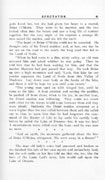 |
gods loved her, but she had given her heart to a mortal, Brian O'Moira. They were to be married, and the two looked often into the future and saw a long life of content together, but the very night of the nuptials a strange illness seized the maiden, and she left the earth.
"The heart of Brian O'Moira could not be consoled. He thought only of his Druid maiden; and, at last, one day he set out on the road to the south, the long road that led to the Land of Souls.
"When he had come to a dim, misty valley, an old man accosted him and asked whither he was going. Then he told him that he had been waiting for him, and that the maiden Maureen had just passed that way. He took Brian up into a high mountain and said, 'Look, that lake far out yonder separates the Land of Souls from this Valley of Shadows. Lay down your body at the banks of the lake, and there it will be kept for you until your return.'
The young man sped on with winged feet, until he came to the lake. A boat awaited, and seizing the paddles, he pushed off from shore, when to his joy, in another boat, the Druid maiden was following. They could not touch each other for the waves would come between them and they were afraid. Suddenly the Druid maiden screamed as a wave higher than the rest rolled between them and she called out to him, to warn him that he had forgotten the command of the Master of Life to lay aside his earthly body before he sailed the Lake of Dreams--but, it was too late! A mountainous wave rolled over the boat--and he was seen no more.
* * * *
"And on earth, the mourners gathered about the bier of Brian O'Moira, whispered, 'He went away in a dream!'"
* * * *
The dear old lady's voice had quavered and broken as she finished this tale of her own mystic and melancholy land, but the soft smile on her lips told me that she, too, like the hero of the Lame Lad's story, fain would sail upon the Lake of Dreams.
|
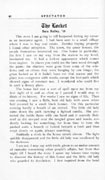 |
The Locket
Sara Bailey, '19
This story I am going to tell happened during my career as an insurance agent. I had been sent to a small village where I was to buy real estate. Besides buying property I found other attraction. The town, the queer houses, the people themselves interested me. One house in particular, the first I saw on my way from the station to my hotel, fascinated me. It had a forlorn appearance which comes from neglect. In places you could see the bare wood through the paint; the shutters were gone from some of the windows and on others they were hanging by one hinge; the grass looked as if it hadn't been cut that season and the place was overgrown with weeds, except the foot-path which showed signs of constant use. I wondered who could live in such a dreary place.
The house had cast a sort of spell upon me from my first sight of it and as often as I passed I would stop to think of its history. For weeks I saw no signs of life. Then one evening I saw a little, bent old lady with snow white hair covered by a small black bonnet. On this particular evening hardly a breath of air stirred. The little old lady came down the path carrying a lighted candle. She protected the feeble flame with one hand and it scarcely flickered as she stooped over the tangled grass and weeds, evidently looking for something, for from time to time she pushed aside a branch or looked beneath a bush and then crept slowly on again, always searching.
Suddenly a clock in the house struck eleven. The light quickly disappeared and the little old lady was swallowed by the darkness.
I am not, I may say with truth, given to an undue amount of curiosity concerning other people's affairs, but from that night till I heard the story I spent my leisure time trying to discover the history of this house and the little old lady who guarded its desolation. I first inquired from the hotel
|
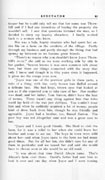 |
keeper but he could only tell me that her name was Thornhill and if I had any intentions of buying the property she wouldn't sell. I saw that questions irritated the man, so I decided to carry my inquiry elsewhere. I finally worked back to a woman who knew.
She was a hale, hearty creature who had spent her entire life on a farm on the outskirts of the village. Partly through my business and partly through the liking that had sprung up between us we became great friends.
"There's no reason why you shouldn't know Joyce Thornhill's story," she said as we were working side by side in her garden, "heaven knows it was once common talk about here, but there are things connected with the story that only I know and though it is fifty years since it happened, it gives me the creeps even now.
"Joyce was one of the prettiest girls in these parts, a mite of a thing, with fine, curly brown hair fluffed around a delicate face. She had large, brown eyes that looked at you as if she expected you to take care of her. Her mother was dead; and her father, Tom Barton, didn't have the best of names. There wasn't any thing against him that folks could lay hold of--he was just shiftless. You couldn't trust him and when he suddenly acquired a lot of money, people kind of drew back from him, though he was friendly and agreeable. Joyce had a brother, too, Russel Barton. The poor boy was not altogether sane and was a great care to her.
"Joyce and I were good friends. She liked to visit the farm, for it was a relief to her when she could leave her brother and come to see me. The boys in town were wild about her--and when Joyce came to the farm we had many good times. But for all her fun, she didn't care for any of them in particular and we teased her and said she would have to choose soon or she would be an old maid.
"It was about that time David Alwyn came. That's Alwyn's farm over there. David's father had sent him to look it over and one day when Joyce and I were coming
|
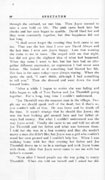 |
through the orchard, we met him. Then Joyce seemed to take a new hold on life. The pink came back into her cheeks and her eyes began to sparkle. David liked her and they were constantly together, but this happiness did not last long.
"I shall never forget the evening they both came to see me. That was the last time I ever saw David Alwyn and the last time I ever saw Joyce happy. Late that evening she came to me in tears. She stayed with me that night, but did not give the slightest idea of what had happened. When day came I went to her, but her face had an altogether different expression, an expression I had never seen before. She looked as if something had blasted her life. Her face is the same today--eyes always staring. When she spoke she said, "I can't think, although I had something to tell you." Then she dressed and went down the road toward home.
"After a while I began to notice she was fading and folks began to talk of Tom Barton and Joe Thornhill going together. For a long, long time I couldn't understand.
"Joe Thornhill was the meanest man in the village. People say we should speak well of the dead; but if that's so, you couldn't talk of him. He was fierce and he drank all the time. It wasn't strange that he should like Joyce; she was the best looking girl around here and her father always had money. But what I couldn't understand was the way Joyce acted. Finally she came to me and told me about Joe Thornhill and her father and what was between them. I told her she was in a free country and that she needn't marry a man she didn't like, but Joyce was a girl who couldn't stand her own ground and I couldn't help her. When I was walking home with her that evening her father and Joe Thornhill drove up to us in a carriage and took Joyce home with them. After that Joyce never came to see me with her father's consent.
"Soon after I heard people say she was going to marry Thornhill. When she told me herself and I asked her dif-
|
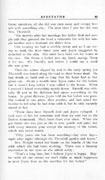 |
ferent questions, all she did was turn away and occupy herself with something else. The next time I saw her she was Mrs. Thornhill.
"Six months after her marriage her father died and people said they guessed she lived a miserable life with her simple brother and a shusband she didn't love.
One evening we had a terrible storm and as I sat trying to read, the door burst open and Joyce staggered in, drenched to the skin. She must have been out for hours in the rain. She thrust a locket into my hand, saying, 'Keep it for me. It's David's, and before I could say a word she was gone.
Then the winter slipped by and in the early spring Joe Thornhill was found along the road to their house dead. He had drunk so hard and so long that his heart had at last given out. About a month later Joyce came for the locket, but it wasn't long before I was called to the house. When I arrived I found everything upside down. Russell was critically ill and in his delirium had upset everything in the house. In great distress, Joyce told me her locket was gone. She looked in one place, then another, and had asked her brother to tell what he had done with it, but he only vacantly stared at her.
"Three days later Russell died and Joyce collapsd. I took care of her for sometime and then we sent her to the Barton homestead. She's been there ever since. When she got better she was just as she is now, gentle and quiet, but with every interest gone except the memory of the locket, which was never found.
"Fifty years she has been searching--day after day--night after night--through the Thornhill garden and house."
Mrs. Wright rested her hands on the handle of the hoe with which she had been working. There was a faraway expression in her eyes as she added softly:
"That's a long time, but I believe Joyce is happy. Maybe--with all our senses we can't claim as much happiness as poor Joyce does as she searches for her locket."
|
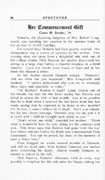 |
Her Commencement Gift
Claire M. Zender, '19
Demaris, the charming daughter of Mrs. Robert Longworth, was spending her vacation at the summer home of her mother in North Carolina.
For several days Demaris had been greatly worried. Her unhappiness was a source of mystery to her mother. One evening after she came from a delightful ride with one of her college chums, Dick Stanton, her mother discovered her sitting in a large chair before a cheerful fireplace, in a fitful slumber. Upon her cheeks were traces of tears and in her hand she clasped a letter.
As her mother entered Demaris roused. "Demaris! Tell me what has just happened," Mrs. Longworth said tenderly. "I cannot understand why you act so stranegly these days, and especially so today."
"Oh Mother! Kenton is dead! Lieut. Carrol, one of his friends, has sent me this letter saying that Kenton was killed in action the 15th of last month. Can it be possible that he is dead when I received the last letter from him last week, saying that he expected to be home in two months? Oh Mother, I cannot believe he is dead! Don't you remember his last cheery message, 'Demaris, pray for me and if it is God's will I shall be brought back safely to you.'"
"Don't worry, my child," consoled her mother. "Think what a wonderful hero he was, dying for his country--and you. This letter says that Kenton had gone 'over the top' four times, and just before his death was commissioned First Lieutenant. You can be proud, my dear, of the memory of such a brave hero."
Time dragged on, weeks seemed months to Demaris, and still no word came from Kenton Cameron, nor further news concerning his death. Almost wearily Demaris returned to school in the fall.
Dick Stanton, Demaris' classmate, tried in every way possible to brighten her life and make her happy, asking her
|
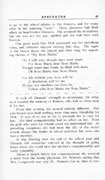 |
to go to the school affairs, to the theaters, and for many rides in his stunning "racer." These pleasures had little effect on heartbroken Demaris. She accepted his invitations but she was not the gay, spirited girl she had been with Kenton.
One great asset that Dick possessed was his melodious voice, and Demaris enjoyed hearing him sing. The night of the Senior dance she played and Dick sang the appealing chorus of "My Rose Marie,"
| "So, I will wait, though days seem years, |
| |
For Rose Marie, dear Rose Marie. |
| Though heart may break, be filled with fears, |
| |
Oh Rose Marie, dear Rose Marie, |
| |
| For life without you, love, will be |
| |
A desolation, and for me |
| No joy, nor sunshine can there be, |
| |
Unless with Rose Marie, my Rose Marie." |
— — — — — — — — — —
It took all Demaris' strength to accompany the song, as it recalled the memory of Kenton, who had so often sung it for her.
From that evening she seemed entirely different. Her sofe brown eyes held nothing more than mere friendship for Dick. It was of no use to try to persuade her to care for him. His kind companionship had no effect on her. Even the girls who were her friends could not understand her. At preceding receptions she had been the life of the entire crowd, always the leader in school activities but now--she was a mystery.
It was drawing near the end of the school year and Demaris felt somewhat relieved at the thought of going home where she could have her mother's companionship and ready sympathy.
About a month before her commencement she received a letter from the family physician, Dr. Winters, saying that Mrs. Longworth was very ill. Demaris lost no time in hur-
|
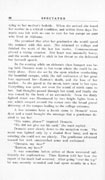 |
rying to her mother's bedside. When she arrived she found her mother in a critical condition, and within three days Demaris was left with no one to care for her except an aunt who lived in Alabama.
She promised that after her graduation she would spend the summer with this aunt. She returned to college and finished the work of the last few weeks. Commencement proved a trying occasion. Her heart was unusually heavy and the words seemed to stick in her throat as she delivered her farewell speech.
In the evening while an elaborate class banquet was being held, Demaris went to her room where she could be entirely alone. Here she sat by the open window overlooking the beautiful campus, while the full realization of her great loss oppressed her--Kenton's death, and the loss of her mother. As she gazed at the moon, tears came to her eyes. Everything was quiet, not even the sound of mirth came to her. Sad thoughts passed through her mind, and finally she was roused by the honk of an automobile. Soon the dimly lighted street was illuminated by two bright lights from a car, which swayed around the corner onto the broad gravel driveway of the campus leading to the college entrance.
A few minutes later a knock came to Demaris' room door and a maid brought the message that a gentleman desired to see her.
"His name, please?" inquired Demaris.
"He did not give me his card," the maid replied.
Demaris went slowly down to the reception room. The room was lighted only by a shaded floor lamp, and upon entering she could not see plainly. The gentleman advanced toward her with outstretched arms and exclaimed:
"Demaris, my dear!"
"Kenton, my hero!"
It was sometime before either of them recovered sufficiently for explanations. Then Kenton told her how the report of his death had occurred. After going "over the top" he was severely wounded and had spent months in a hos-
|
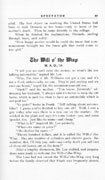 |
pital. His first object on reaching the United States had been to seek Demaris at her home--only to learn of her mother's death. Then he came directly to the college.
When he finished his explanations, Demaris, smiling through tears, said softly:
"How happy mother would be could she know that commencement brought me the finest gift that could come to any girl."
The Will o' the Wisp
M. A. O., '19
"I tell you that we can't raise the money, so what's the use talking automobile," argued Mr. Lee.
"Why, I'm sure if Mr. Williams can get a car, and it's not a Ford, either--why we can. They're just renting and we own our house," urged Ed, the seventeen-year-old son.
"Hush!" said his mother. "You know, Jeremiah," addressing her husband, "I always said it's better to keep the old horse, which is paid for, than to have an automobile which is not paid for."
"Ye, gods!" broke in Frank. "Still talking about automobiles? I guess you've decided to buy one, eh? Well, I met a guy today who says there is a new car on the market. He worked in the plant and says it's some looker--yes, and some speeder, too. Just like its name--and cheap."
"What is it?" inquired Mr. Lee patiently.
"What--its name or price?"
"Oh--bother the name--"
"Eleven hundred dollars, and it is called the Will-o'-the-Wisp. Has any number of cylinders and electric gears. Remember, dad, I'll help pay, and--say--why don't you sell two of those old horses out on the farm?"
After a lengthy discussion, Mr. Lee yielded, and preparations were made to welcome the Will-o'-the-Wisp.
The Lees had not owned the Will-o'-the-Wisp very long before the family observed that Frank was frequently absent,
|
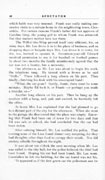 |
which habit was very unusual. Frank was really making successive visits to a certain home in the neighboring town, Cloverdale. For certain reasons Frank's father did not approve of Caroline Grey, the young girl to whom Frank was attracted. But that matters neither her nor there.
The Will-o'-the-Wisp proved itself very efficient, for, on rainy days, Mr. Lee drove it in to his place of business, and on shopping days or bargain days Mrs. Lee drove it to town, for she, too, learned to operate it. Seventeen-year-old Edward received permission to use it for baseball or football games. In about two months the family unanimously agreed that the car was not a luxury, but a necessity.
One afternoon, as Mr. Lee was about to begin his work, the telephone rang. He turned with a frown as he said "Hello." There followed a long silence on his part. Then finally, clutching his desk with his unoccupied hand:
"What, the car gone? Surely, Annie, there must be some mistake. Maybe Ed took it, or Frank--or perhaps you made a mistake, or--"
Another long silence on his part. Then he hung up the receiver with a bang, and, pale and excited, he hurriedly left the office.
At home Mrs. Lee explained that she had planned to go to a distant part of the city for the afternoon. When she went to the garage she discovered that the place was empty. Knowing that Frank had been out of town for two days and that Ed was safe at school, she had concluded that the car had been stolen.
After calming himself, Mr. Lee notified the police. That evening none of the Lees found dinner very tempting, for they had thoughts other than food to occupy their minds. Nor did anxiety subside throughout the night.
It was about ten o'clock the next morning when Mr. Lee was called to the city hall, for the police believed the thief had been found. Hoping his car had been found, Mr. Lee went. Crestfallen he left the building, for the car found was not his.
"It appeared as if the first green car the policeman saw he
|
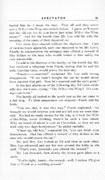 |
hauled him in--I mean the man. They all said they never saw a Will-o'-the-Wisp automobile before. I guess we'll never find the old car, for do you know just what Will-o'-the-Wisp means?" And for the fourth time Mr. Lee told his wife the meaning of the name of their departed car.
Two more days elapsed without the slightest clue. Cars of various types appeared, each one supposed to be Mr. Lee's. Finally in exasperation the unhappy man offered a reward of fifty dollars to the man who would return to him safely his own automobile.
To add to the distress of the family, on the fourth day Mr. Lee received a telegram from Frank, stating that he and his wife, Caroline Grey, would arrive the next day.
"Frank----married!" exclaimed Mr. Lee with strong disapproval. "If we hadn't bought the car he would never have married that girl. Now he's married and the car's gone."
In the late afternoon of the following day Ed burst excitedly into the house, crying: "The Will-o'-the-Wisp! It's coming--out front."
The family all rushed to the porch just as the car came to a full stop. To their amazement out stepped--Frank and his bride.
"You see, dad, it was this way," Frank explained, "we thought we would surprise you and not tell you we were married. We had no ready money for the trip, so I took the Will-o'-the Wisp, never thinking there'd be such a fuss raised. Why we heard all about it over at Cloverdale, so here we are with only two days honeymoon," he added ruefully.
"Cheer up, old boy," counseled Ed, "you can finish your honeymoon. Dad has offered a reward of fifty dollars to the man who would return the car."
Mr. and Mrs. Lee looked at Ed and then at each other. Mrs. Lee advanced and put her arm around the bride as she said: "That's true, Jeremiah; you offered the reward."
Mr. Lee frowned, then slowly the frown gave place to a smile.
"You're right, Annie--the reward--well, I reckon I'll give that to Frank as a wedding present."
|
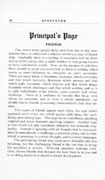 |
Principal's Page
FRIENDS
One meets many people daily, and from day to day associations there is cultivated a relation which is a type of friendship. Gradually there is a sorting of associates and an elimination which leaves only a small number in that group known to have confidential worth. Now, in the process of selection, there should be great care exercised, as there is nothing which exerts so much influence on character as one's associates. There are many kinds of literature, literature which entertains, and that which instructs, literature which amuses and that which palls, literature which inspires and that which drags, literature which challenges and that which soothes, and so it is with individuals--some irritate, some console and others challenge. There is a tendency to become like those with whom we associate, and so from a selfish standpoint one should choose friends possessing characteristics that they admire.
Two types of friends appear most often, the type which applauds one's every act, which agrees with ideas, the vacillating, patronizing type. This type never contributes anything original and never demands anything original. Another type is that which not only contribute initiative, but demands originality. Instead of agreeing with all thought that is expressed, there is immediately a challenge, a question arises, one is stimulated to accuracy, to correct thought, and to correct language.
The patronizing friend may seem more desirable and less irritating, but the challenging friend is the one that is doing his associates a service. Welcome question, welcome criticism, choose friends that demand the best there is in you and in so doing insure to yourself constant development.
|
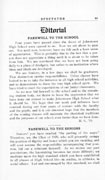 |
Editorial
FAREWELL TO THE SCHOOL
Four years have passed since the doors of Johnstown High School were opened to us. Now we are about to pass out. Not until now, however, have we felt such a keen sense of appreciation. This is probably due to the fact that a person does not appreciate a thing until it is about to be taken from him. We are convinced that we have not been going daily to a place of drudgery, but rather to an institution where ideas and ideals are developed.
We are Seniors; in a few days we shall be graduates. That distinction carries responsibilities. Other classes have looked to us to take the initiative in all high school activities, and to demonstrate to them the true high school spirit. We have tried to meet the expectations of our junior classmates.
As we now bid farewell to the school and to the remaining student body, we desire to leave the impression that we have done out utmost to make Johnstown High School what it should be. We hope that our work and influence have counted during our four years of contact with the faculty and the pupils, and it is our sincerest hope that the members of the coming classes will maintain the cherished traditions and the purposes of our school, even better than we have done.
M. S., '19.
FAREWELL TO THE SENIORS
Seniors! you have reached "the parting of the ways." Therefore, we, the Class of 1920, who will presently occupy the position of dignity and honor which you are vacating, and will soon assume the responsibility accompanying that position, bid our a reluctant farewell. As we review our past associations, the leavetaking becomes far more difficult; we meditate upon the high standard which you have established in all phases of High School life--in studies, in athletics, in social affairs. Led and encouraged by that standard, we shall
|
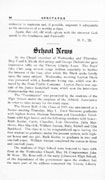 |
endeavor to maintain and, if possible, augment it adequately as the successors of so worthy a class.
Again, that old, old wish--given with the sincerest Godspeed, to the Graduates, and Farewell!
H. V., '20.
School News
At the Chapel exercises of Wednesday and Thursday, May 7 and 8, Rhoda McCartney and George Dudenhofer gave impressive talks on the Victory Liberty Loan. The Boys' Glee Club sang several songs written especially to further the interest of the loan, after which Mr. Black spoke briefly upon the same subject. Wednesday morning Leyton Davis was presented with a handsome loving cup, which was donated by the Penn Traffic Company. Leyton Davis was captain of the Junior basketball team, which won the inter-class championship this season.
The "Toastmaster" was presented by the students of the High School under the auspices of the Athletic Association in order to raise money for the track team.
The Honor Roll of the Class of 1919 was announced at a Senior meeting Thursday, May 1. Estol Simmons graduates with highest honor, Herman Beerman and Gwendolyn Teitelbaum with high honor, and the following students with honor: Ruth Keslar, Carrie Chandler, Lois Detweiler, Julia Matthews, Max Shavrick, William Auman, Ruby Rishell and Olin Burkhard. The class is to be congratulated upon having the first student to graduate, under the present system, with highest honor and one girl, Ruth Keslar, to graduate in two and one-half years. William Auman completed the course in three and one-half years.
The students of High School were honored to have with them at the Wednesday Chapel, May 14, Congressman John M. Rose. Mr. Rose told of the early Johnstown High School, of the dependence of the government upon the student, but the main part of his address concerned the Victory Liberty
|
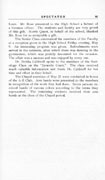 |
Loan. Mr. Rose presented to the High School a helmet of a German officer. The students and faculty are very proud of this gift. Norris Quest, in behalf of the school, thanked Mr. Rose for so acceptable a gift.
The Senior Class entertained the members of the Faculty at a reception given in the High School Friday evening, May 9. An interesting program was given. Refreshments were served in the cafeteria, after which there was dancing in the gymnasium, which was prettily decorated for the occasion. The affair was a success and was enjoyed by every one.
Dr. Bertha Caldwell spoke to the members of the Sociology Class on the "Juvenile Court." The class received much valuable information and thanked Dr. Caldwell for her time and effort in their behalf.
The Chapel exercises of May 21 were conducted in honor of the A-B Club. Arm bands were presented to the members in recognition of the work they had done. Seven persons received bands of various colors according to the terms they represented. The remaining students received their arm bands at the close of the Chapel period.
|
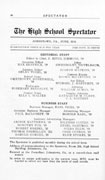 |
The High School Spectator
JOHNSTOWN, PA., JUNE, 1919
| SUBSCRIPTION PRICE $1.25 PER YEAR |
PER COPY, 50 CENTS |
| EDITORIAL STAFF |
| Editor in Chief, F. ESTOL SIMMONS, '19 |
Associate Editor
MAX SHAVRICK, '19
Literary Editor
HELEN VOGEL, '20
School News
GWENDOLYN HONEYWELL, '19
Exchanges
ROSEMARY BRANAGAN, '19
Alumni Notes
ELLA C. WALTER |
Jokes
GWENDOLYN TEITELBAUM, '19
EUGENE WATKINS, '19
Current Events
RHODA McCARTNEY, '19
Art Editor
MICHAEL J. HARTNETT, '19
Athletics
WILLIAM AUMAN, '19
Faculty Advisors
KATHARINE M. ULERY,
C. L. SANDERS |
| |
|
| BUSINESS STAFF |
| Business Manager, KARL FRIES, '19 |
Assistant Business Manager
PAUL McCLOSKEY, '19
|
Advertising Manager
HAROLD KAHL, '19 |
| Assistant Advertising Managers |
ARCHIE MATTHEWS, '19
DOROTHY FOX, '19
ROBERT KREDEL, '20
THOMAS TREMELLEN, '22½
HAROLD HORNER, '20 |
MILDRED CUSTER, '19
ETHEL HARTMAN, '19
HILDA ELLIS, '19
FRED CONRAD, '22
ELSIE STOKES, '20 |
The Spectator is published monthly during the school term.
Address all communications to the Spectator, Room 216, High School Building, Johnstown, Pa.
Entered at the Postoffice; Johnstown, Pa., as a second-class mail matter.
In order to secure publication in the current issue, MSS. must be handed to editor not later than the tenth of each month.
|
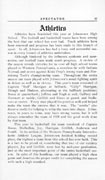 |
Athletics
Athletics have flourished this year at Johnstown High School. The football and basketball teams have been among the best that our school has ever had. Track athletics have been renewed and progress has been made in this branch of sport. In all, Johnstown has had a busy and successful season in every branch of athletics undertaken.
Although hindered by the influenza epidemic and quarantine, our football team made much progress. A review of the season reveals victories for us over all high school teams played in Western Pennsylvania, a scoreless tie with Indiana Normal, and scores against Kiski Prep's strong team and Harrisburg Tech's championship team. Throughout the entire season our team played with Johnstown's usual fighting spirit in defeat as well as in victory. This year's team consisted of Captain "Red" Harrigan at fullback; "Celly" Harrigan, Blough and Hudson, alternating at the halfback positions; Reese at quarterback; Jeffries and Engh at end; Gaffney and Hartnett at tackle; Griffith and Haws at guard, and Stellevato at center. Every man played his position well and helped make the team the success that it was. The "scrubs" also deserve credit for helping to whip the team into shape. Johnstown, in years to come, may have strong teams, but it will always remember the team of 1918 and the good work done by that team.
This year in basketball the team consisted of Captain Reese, Mulhollen, Joy, Harrigan, Griffith, Anderson and Gould. In its section of the Western Pennsylvania Interscholastic Athletic League, Johnstown finished holding second place, the highest a team from this school has ever held. This is a fact to be proud of, considering that two of our varsiety players, Joy and Griffith, were lost by mid-year graduation, just at the most important point of the entire basketball season. In spite of this handicap, our team played a high class game and deserves the proper credit for completing the season with such a high standard.
|
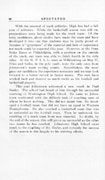 |
With the renewal of track athletics, High has had a full year of athletics. While the basketball season was still on, preparations were being made for the track team. Of the forty candidates, about twelve have made the team and have developed it into one that students may be justly proud of. Because of "greenness" of the material and lack of experience not much could be expected this year. However, at the Penn Relay Races at Philadelphia, with a position on the outside of the track, our team was able to finish fourth in the mile relay. At the W. P. I. A. L. meet at Wilkinsburg on May 17, Fries and Safko, in the pole vault, were the only ones from Johnstown's team scoring points. Nevertheless, the meet gave our candidates the experience necessary and we may look forward to a better record in future meets. The men have worked hard and deserve as much credit as the football and basketball players.
This year Johnstown welcomed a new coach in Paul Beeler. The school had heard of him through his successful coaching of Washington High School. He came to Johnstown confronted with the difficult task of coaching men of whom he knew nothing. This did not daunt him. He developed a football team that did not have an equal in Western Pennsylvania. He also coached a basketball team that was as successful as the football team. Then he undertook the coaching of a track team from new material. No doubt, by the end of the season, this will prove aa successful as the other two teams he has coached. Johnstown High School owes much to the coaching of Mr. Beeler, and certainly the success of the season is due to his untiring efforts.
|
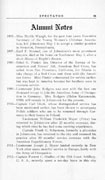 |
Alumni Notes
| 1893— |
Miss Myrtle Waugh, for the past four years Executive Secretary of the Young Women's Christian Association, left Johnstown May 1 to accept a similar position in Scranton, Pennsylvania. |
| 1897— |
Karl F. Stremel, one of Johnstown's most prominent lawyers, died at his home on Southmont May 1, after a short illness of Bright's disease. |
| 1905— |
Ethel G. Pinder, late Director of the Bureau of Instruction and Nurses' Aid, American Red Cross, has sailed from San Francisco, California, for Siberia to take charge of a Red Cross unit there with the American forces. Miss Pinder volunteered for service earlier, but was kept in America because her brothers were in overseas service. |
| 1909— |
Lieutenant John Rogers was sent with the first one thousand troops to Join the American Army of Occupation in Germany. Mrs. Rogers (Helen Katzenstein, 1910) will remain in Johnstown for the present. |
| 1910— |
Captain Carl Glock, whose distinguished service has been mentioned earlier, has been chosen to accompany Polish soldiers who are to be returned through Germany to their homes in Poland.
Lieutenant William Frederick Mayer (Fritz) has returned to Johnstown after 22 months overseas, during which time he has had some exciting experiences.
Captain Frank G. Scharman, formerly a physician in Johnstown, has returned to the city and resumed his practice after 10 months' service overseas with the American Expeditionary Forces. |
| 1911— |
Lieutenant Joseph J. Meyer landed recently in New York after many months' service in Europe, lately with the Army of Occupation. |
| 1912— |
Captain Forrest C. Shaffer, of the 55th Coast Artillery, U. S. A., recently spent a ten-day leave in this city |
|
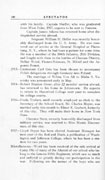 |
|
with his family. Captain Shaffer, who was graduated from West Point, 1917, expects to be sent to Panama.
Captain James Adams has returned home after distinguished service abroad.
Sergeant William H. Heller was recently honorably discharged from the U. S. Army. He was mustered out of service at the General Hospital at Plattsburg, N. Y., where he had been a patient for some time. He was a member of the 104th Infantry, 26th Division, and fought with them in the battles of Chateau-Thierry, Bellau Wood, Fismes-Soissons, St. Mihiel and the Argonne Forest. |
| 1913— |
Lieutenant Carl Geis has been chosen to accompany Polish delegations through Germany into Poland.
The marriage of Wilma Von Alt to Misha S. Yatrotsky was announced early in May. |
| 1914— |
Robert Bratton Greer, after 22 months' service abroad, has returned to his home in Johnstown. He expects to return to Haverford College next year to complete his college course. |
| 1916— |
Freda Trabert, until recently employed as clerk to the Secretary of the School Board, Mr. Charles Meyer, was married early this month to Elmer E. Goebert, formerly of this city. They will make their home in New York State.
Clarence Stem, recently honorably discharged from military service, was married to Miss Mamie Zimmerman, of this city. |
| 1917— |
Lloyd Bryan has been elected Assistant Manager for next year of the Red and Black, a publication of Washington and Jefferson College, where he has been a student for two years. |
| Miscell |
aneous—Word has been received of the safe arrival at Camp Dix of many of the Alumni of our school who belong to the famous 110th Regiment, which saw so much and suffered so greatly during our participation in the war. Following are the names of the boys who are |
|
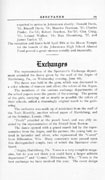 |
|
expected to arrive in Johnstown shortly: Donald Davis, '11; Russell Davis, '14; Maurice Pearman, '15; Charles Pinder, Ex-'13; Robert Bracken, Ex-'15; Glea Creig, '15; Leland Walker, '14; Max Bloomberg, '17, and James Taylor, '17. |
| The rec |
eption and dance held April 30th at the Moose Temple for the benefit of the Johnstown High School Alumni Fund proved a great success socially and financially. |
Exchanges
The representative of the Spectator's Exchange department attended the dance given by the staff of the Argus of Harrisburg, Pa., on Wednesday evening, June 4th.
The dance was held in the gym, which was decorated in a color scheme of maroon and silver, the colors of the Argus.
The members of the various exchange departments of the school papers were the guests of the evening. The gowns of the girls, carrying out as nearly as possible the colors of their schools, added a charmingly original touch to the gathering.
The orchestra was made up of musicians from the staff of the Tech Monthly, another school paper of Harrisburg, and of the Scimitar, Lorain, Ohio.
"Froth" presided at the punch bowl, and was ably assisted by the representative of the Distaff from Boston.
The dance opened with a grand march led by the representative from the Argus, and his partner, the young lady attired in lavender and silver, who represented the "Comet" from Milwaukee, Wis. Many comments were passed upon this distinguished couple, two of which the Spectator overheard.
,"Argus, Harrisburg, Pa. Yours is a very complete magazine, but do you not think you could have a larger athletic department?" and "Comet," Milwaukee, Wis.: "Yours is the best exchange we have received this year. The cover design
|
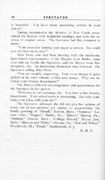 |
is beautiful. You have many promising writers in your school."
During intermission the Monitor of New Castle entertained the dancers with delightful readings, and with the reciting of original verses. The Spectator had this comment to make:
"Your poets are making your paper a success. But could you not have more cuts?"
Miss Prori, who had been dancing with the handsome, light-haired representative of the Magnet from Butler, came over and sat beside the Spectator, and the Mirror from Birmingham, Ala. An interesting discussion then followed. The Spectator telling Miss Prori:
"You are steadily improving. Your cover design is quite artistic in its color scheme of blue and canary. Why not increase your literary department?"
The Mirror reflected encouragement and appreciation for the Spectator in her speech:
"Welcome to our exchange list. You have a fine literary department. Your school news is interesting. But why combines your jokes with your ads"?
The Spectator, although she did not give her opinion of every one of her partners, yet wishes to acquowledge the kindly greeting of "Distaff," Boston, Mass.; "Scimitar," Lorain, Ohio; "Magnet," Butler, Pa.; "Mirror," Sharon, Pa.; "Student," Detroit, Mich.; "College Record," Moose Jaw, Sach.; "Maroon and White," Altoona, Pa.; "Red and White," Woodstock, Ill.; "Shield," Haddonfield, N. J.
R. M. B.
|
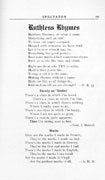 |
Ruthless Rhymes
Ruthless Rhymes, oh what a name
Underlying such an aim!
To keep our paper occupied,
Heaped with nonsense we have tried.
Let it be now what it may be,
Everything but good poetry;
Save some words which sometimes rhyme
Such as words like time and climb.
Right are those who TRY to write,
Hard is their poetic life..
Young or old it is the same,
Making rhymes without a name
Ends our life, as all things do,
Seldom done till we are through! —N. R. Q. |
| |
Parody on "Smiles"
|
| |
There's a class in which I'm bored,
There's a class in which I'm blue,
There's a class in which there's nothing
Which I really want to do.
There's one class in which I'm happy,
Where I am not quite so grim,
There's a reason, quite apparent,
Then I'm sitting next to him. |
| —Sent. I. Mental. |
| |
Marks
|
| |
Here are the marks I made in French;
They're the marks I made so bad.
There's the marks I made in History,
They're the first real marks I had.
There's the marks I made in English,
They're the marks I can recall.
But the marks I made in Virgil
Are the punkest marks of all. |
| —A. M. M. |
|
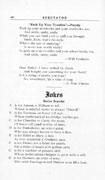 |
"Pack Up Your Troubles"--Parody
|
| |
Pack up your notebooks and your textbooks, too,
And smile, smile, smile.
While you can bluff a bit to pull you through,
Smile, Kids, that's the style.
What's the use of studying?
It never was worth while!
So pack up your troubles and your school books, too,
And smile, smile, smile. |
| —Will Graduate. |
|
| |
Dear Mabel: I have cashed by check
And bought you something for your Neck!
Is it a string of pearls, you hope?
No, sweetheart, 'tis a cake of soap. |
| —A. Non. Umous. |
|
Jokes
Senior Scandal
| A |
is for Auman, a William to tell,
Whose wonderful motto is always "Duwell." |
| B |
is for Beerman, an honor roll star,
Whose mathematical knowledge reaches par. |
| C |
is for Chandler to Carrie the name,
Of honor roll pupil worthy of fame. |
| D |
is for Dudenhofer, an orator great,
Who was always known to have a date. |
| E |
is for Eckel as Mary, a lass,
As ever requested a Graduate pass. |
| F |
is for Fisher, not a fisher for pearls,
But a fisher of lasses with golden curls. |
| G |
is for a Gardner of greatest skill,
Whose smiles always happen to grow with a will. |
| H |
is for Hartnett, an artist of note,
Who with Harrington and Hudson soon fill a boat. |
|
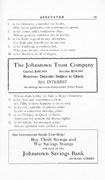 |
| I |
is for Industry, a member, no doubt,
Who never graduates, but continues to sprout. |
| J |
is for Jones, and a handsome chap,
Whose greatest ambition lies in his hat. |
| K |
is for Kahl, a good money substitute,
For Kale and Harold are in one suit. |
| L |
is for Lightcap, a studious lad,
Who was in fact, never known to be mad. |
| M |
is for Masters, an M of degree, |
The Johnstown Trust Company |
| Capital, $200,000 |
Surplus $250,000 |
|
| Receives Deposits Subject to Check |
| 3½% INTEREST |
| On Savings Accounts compounded Twice Yearly |
|
| |
Whose main hobby, we find is Boys' Chemistry. |
| N |
is for Nau and sometimes a then,
It's Tillie if there happens to be no end. |
| O |
is for Ott, and this trombone slider
Is also a swomewhat dancing glider. |
| P |
is for Picking, in Quest of Reitz,
And votes for women she always fights. |
| Q |
is for Quirk, the manager great,
Whose splendid team pulled a stake. |
| Our Government Needs Your Help! |
Buy Thrift Stamps and
War Savings Stamps |
| FOR SALE AT THE |
Johnstown Savings Bank |
| 444 MAIN STREET |
|
|
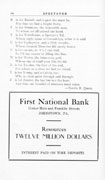 |
| R |
is for Rishell, and a gem she must be,
For thus we find a bright Ruby. |
| S |
is for Simmons, the honorable man,
To whom we all extend our hand. |
| T |
is for Teitelbaum, a Spectator Ed,
Whose right name is Gwendolyn, when it is said. |
| U |
is for Updegrave, and a little wonder,
Whom General Menoher did surely honor. |
| V |
is for vacant, no V's I can find,
So I'll use vacant in filling this line. |
| W |
is for Wertz, the humorous grid,
Whose cup of chaff soon fills the lid. |
| X |
is for Exodus, the first of the end,
For whom as a class we find no friend. |
| Y |
is for Young, and a Calvin, too,
Who is often quiet through and through. |
| Z |
is for Zender, the last but not the least,
And thus our Scandel of nineteen must cease. |
|
—Norris R. Quest. |
First National Bank |
Corner Main and Franklin Streets
JOHNSTOWN, PA. |
|
Resources
TWELVE MILLION DOLLARS |
|
| INTEREST PAID ON TIME DEPOSITS |
|
|
Contributed to the PAGenWeb Archives by Lynne Canterbury & Diann Olsen, 2006.
|